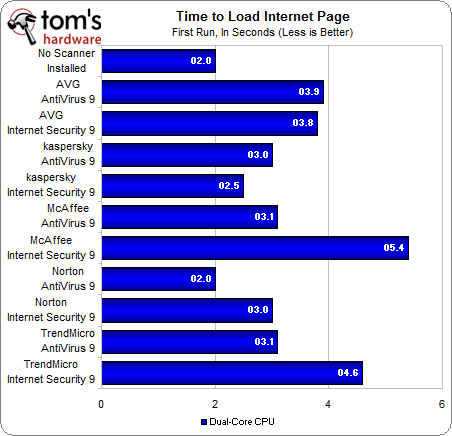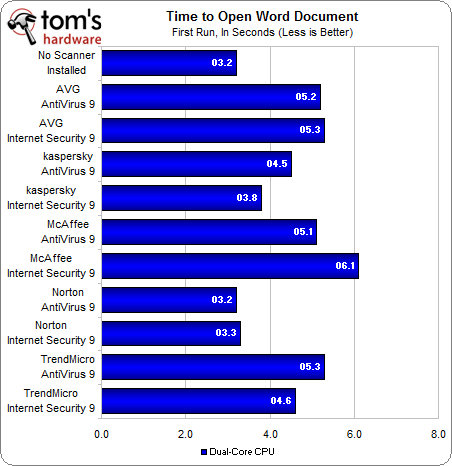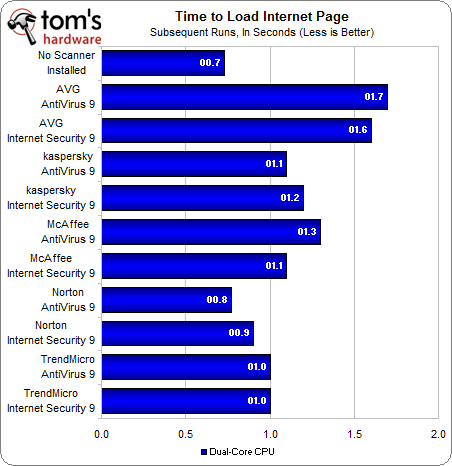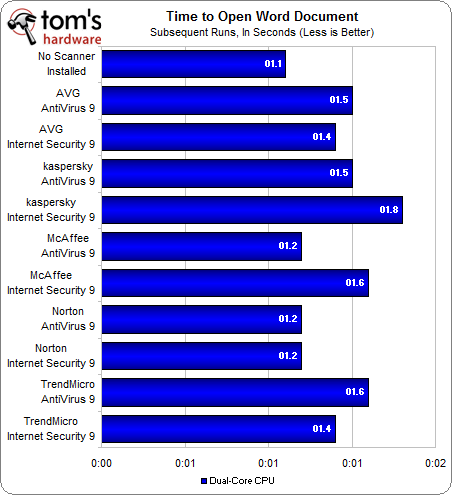Do Virus Scanners Slow Down Your System?
Does the presence of a virus scanner guarantee reduced performance, or does it have a negligible impact? We test 10 different products to see if you’re unknowingly suffering with security software.
Response Time Benchmarks
It is our intention to benchmark the boot time with these different security solutions installed, and we spent a lot of time testing this using GreenVantage’s WinBootInfo utility. Unfortunately, the results we recorded show a huge variance from 30 to 60 seconds, even when taken one after the other, and we’re not comfortable releasing these results even after averaging multiple iterations. What we will say is that all of the averages we recorded are between 32 and 46 seconds. With boot times ranging from 30 to 60 seconds, there probably isn’t any significant conclusion to draw.
The response time benchmarks we demonstrate below are much more consistent. We open a document in Word and a LAN-hosted Web page in Firefox. Here’s how long it takes, on average, to open these files the first time after a fresh boot into Windows:
While we do experience significant variance between minimum and maximum load times for each security software package, with six iterations averaged, we see some clear trends across Firefox and Word. Most notably, AVG, McAfee, and Trend Micro products seem to take a little longer to open files than their competitors. McAfee Internet Security, specifically, has a longer wait time to launch the test Web page.
Speaking of McAfee, with this product installed, we notice a colossal lag to launch the timer application we developed to record benchmark results. When I say colossal, I mean it takes the better part of 10 seconds to launch the tiny program—an application that executes instantly with any other anti-virus program we tested. The reason for this appears to be that McAfee’s real-time scanning method is based on checking against known application signatures. Since McAfee obviously can’t have signatures for custom-made applications, it will thoroughly scan the application in question before launch. It does seem to take longer than it should to accomplish this task. We’re asking McAfee about this and hope to have an answer before publication—otherwise, we will follow up in a future article.
Back to the results, though. The bar graphs do make it appear that there is a large variance on first load, but we’re talking about a two to five-and-a-half second spread to open Firefox and a three-to-six-second spread to open a Word document. It sounds worse than it feels, as those extra few seconds don’t seem all that obvious. Admittedly, that’s a subjective argument.
What is objective is that the same application loads much faster the second time it is launched during a Windows session:
The difference in application launch speeds is reduced to less than a second between competing security software solutions on subsequent runs of the same program. This is a short enough time span that it's difficult to notice any change at all during real-world use.
Get Tom's Hardware's best news and in-depth reviews, straight to your inbox.
Current page: Response Time Benchmarks
Prev Page General Use Benchmarks Next Page Single-, Dual-, And Quad-Core BenchmarksDon Woligroski was a former senior hardware editor for Tom's Hardware. He has covered a wide range of PC hardware topics, including CPUs, GPUs, system building, and emerging technologies.
-
iam2thecrowe before i read the article, my guess is Norton is the slowest and most useless....Reply -
well from my point of view - antivirus scanner do application loading to take a much longer time and this was proven by your tests.Reply
I think that AV software has no place into todays operating systems except for inexperincied users. I'm investing money to fast SSD disc to improve performace, why the hell intstall AV software to push performance back? -
micr0be talk about heavy modifications on the new set of AVs compared to the older ones ... my surprise is norton which i was expecting to cripple the system to a halt .... very nice article btwReply -
The test rig's CPU looks funny to me.Reply
Athlon II X4 645
3.5 GHz, Quad-Core, 6 MB L3 Cache
Isn't that a Phenom?



